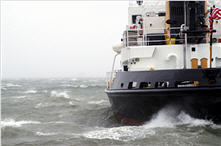Death on the High Seas Act
 The Death on the High Seas Act provides compensation to the surviving family of people killed while at sea. Recovery under the act historically was limited to financial loss; however, it is now possible to recover for the pain and suffering of the family. In order for family members to recover losses, the death must be the result of negligence or reckless actions of the owner or crew members of the vessel.
The Death on the High Seas Act provides compensation to the surviving family of people killed while at sea. Recovery under the act historically was limited to financial loss; however, it is now possible to recover for the pain and suffering of the family. In order for family members to recover losses, the death must be the result of negligence or reckless actions of the owner or crew members of the vessel.
Pecuniary Damages
The financial damages that may be recovered under the act are called pecuniary losses. Pecuniary losses are meant to replace the financial value the deceased would have contributed to his or her surviving family had he or she not died. This award is not limited to earning potential, and arriving at an exact value often requires expert calculation and testimony to support a claim.
Death at Sea
The act is meant to cover situations in which a death occurs at sea. If an individual is injured at sea and later dies, the act does not offer apply, with two exceptions: if a lawsuit is pending under other maritime laws or if a personal injury action based on the same injury at sea is pending.
Statute of Limitations for Claims
Suits under the act must be filed within three years from the date the action occurred. The date the action occurred is typically the date of death, but in the case of death resulting from injuries sustained at sea, the date may be the date of the injury. It is important to seek the advice of an experienced maritime attorney so that rights under this act are not lost.
Connect with Top-rated Attorneys Near You
Sponsored Advertisement
Other Admiralty and Maritime Law Center Topics
Latest Article
The Exclusionary Rule: Definition, Examples, and Impact
What Is the Exclusionary Rule? What Are Common Situations Where It Applies? Are There Exceptions? How Has It Changed Cri... Read More
Lying Under Oath: The True Penalty for Perjury
What Is Perjury? What Must the Prosecutor Prove? What Are the Penalties? In the legal system, oral and written testimon... Read More
Protective Order vs. Restraining Order
What Is a Protective Order? What Is a Restraining Order? When Are They Commonly Used? You've been a victim of domestic ... Read More
GETLEGAL®ATTORNEY DIRECTORY
Find Leading Attorneys in Your Area
NEED PROFESSIONAL HELP?
Talk to an Attorney
How It Works
- Briefly tell us about your case
- Provide your contact information
- Choose attorneys to contact you





